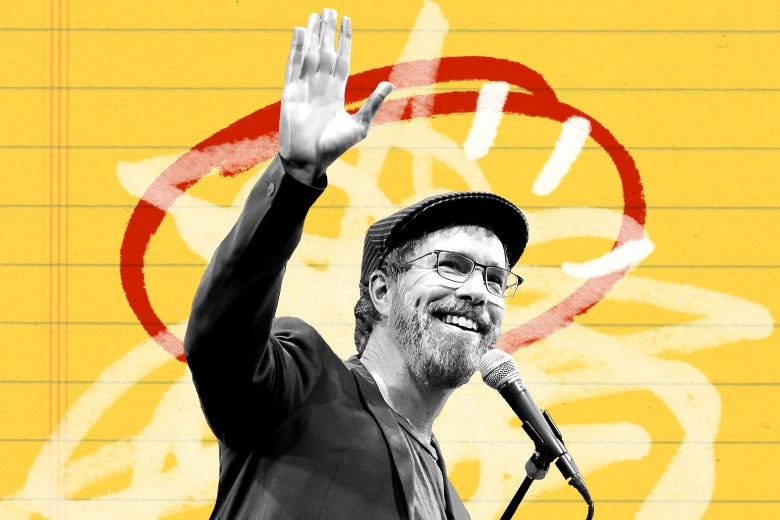
Photo illustration by Slate. Photo by Ethan Miller/Getty Images.
On a recent episode of How To!, Lorenzo, a dental student in Montreal, learns how to write a breakup song with the help of a special guest: singer-songwriter (and now author) Ben Folds. Folds talked to host Charles Duhigg about how he wrote some of his best breakup songs and how to live a creative life. This excerpt of their conversation has been condensed and edited for clarity.
Charles Duhigg: Can you give us an example of a song where you really struggled through it?
Ben Folds: That’s easy. There’s one that the music came really quickly, which it usually does, but I wanted this song to be the first song on my next album for four albums straight, so it was well over a decade of sitting on this song. But I just didn’t know what it was about. I couldn’t find it.
So I had that [melody] going through my head, but I had no idea what it was. And then eventually I found myself—it’s another breakup song—sitting on a big huge pile of boxes that were just delivered to my new broke-ass condo. And I’m just sitting in the middle of all of it. And, again, bumming a little bit. But then suddenly I thought: You know what? I could put this stuff anywhere I want to. I can put my stereo anywhere I want to. I can decide to get a boa constrictor and a lava lamp if that’s what I want to do. And that was a happy beginning.
You know, I made it very, very literal. I was just looking around the room. It’s like [singing] a mattress and a stereo/ Just like I started/ And a note composed with thumbs and phone/ On unpacked boxes/ It’s so well written/ But I won’t be sending it/ And I will not forget you/ There was nothing to forget/ So there. So the song is “I can’t forget you, there’s nothing to forget at this moment. I don’t even remember where I was. I’m now looking ahead.” And then the “so there” is like, “got you, I forgot you for a second.” And that’s a happy, childish thing to tell someone. So it all feels right with the music to me.
That song, which he called “So There,” was the title track of an album he released in 2015.
The problem with writing a song is that you have very little real estate to work in. I mean, really, you’re going to have four or six couplets in three verses’ worth of those; a little bumper sticker to hang the whole thing on, which is your chorus; and probably a bridge just to keep people from getting tired of the song and come back. But when you come back from that bridge, you should be a different person. The third chorus should always be sung by someone who’s not quite the same person as the first chorus. A really great song will do that.
And this brings us to the next rule. Sometimes if you’re having trouble coming up with a creative idea, the secret is, rather than giving yourself a limitless horizon, to create constraints. When you have to work within a small box, sometimes it pushes you to find the most creative way out of it.
And when you finally make that turn, does the song all of a sudden appear to you?
Now at that point I’m sitting with a big stack of notecards and a bottle of scotch. And just sit there. I don’t drink straight out of the bottle. I wouldn’t recommend that. Sad. And I write these thoughts on notecards, because they represent to me not enough real estate. You can’t write your story on it. They’re small. It gives me a physical “that’s a verse.” If I’m having to write in the corners of that thing, I’ve said too much.
You’ve talked about the fact that anyone can be creative. Is it worth it for someone like Lorenzo, who—I mean, he’s in dental school, he’s going to be a dentist. Is this a good use of his time to write something?
I think it’s a great use of time because you’re communicating.
Why?
Well, because people are fundamentally creative beings. The truth is we’re at the top of the food chain because we have ideas and we’re creative. So whether you’re building a train system across the U.S. or fixing someone’s teeth, no matter what it is, you will be a creative being. And to not completely fulfill that in your life is to do everything less, is to hold back part of who you are.
I mean, my dentist is great. I go to a dentist who’s about 65, maybe getting up on 70 years old. I’ve flown to Los Angeles for the past 20 years to go to this guy. He reads me his poetry while I’m going numb. He recites poetry while he’s drilling my teeth or giving me a root canal. And it’s a huge part of the experience for me.
I might have an appointment for you in Montreal when the L.A. dentist is ready to retire.
The real advantage to this is that you would have so much cotton and stuff in my mouth, I wouldn’t be able to talk.
To listen to the entire episode, click the player below or subscribe wherever you get your podcasts.
from Slate Magazine https://ift.tt/2HO2P3s
via IFTTT
沒有留言:
張貼留言